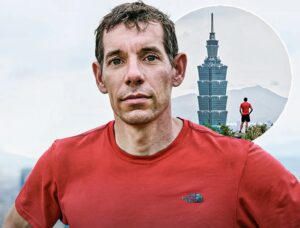If you didn’t know who Franco Cookson was until what seems like yesterday, you’re not alone. The esoteric Brit spent years climbing — very hard — in backwaters around the United Kingdom.
But last year, he climbed into the international ranks with the first ascent of a wild sandstone route in Yorkshire. Cookson graded it E11 7b, making it possibly the country’s hardest and most dangerous trad route.
He called it Immortal.
Cookson appears to marshal as much bravado as he does stone-cold climbing ability. True to form, he displayed both on his most recent wickedly hard, potentially catastrophic first (or second?) ascent.
‘The Sandman,’ according to Franco Cookson
The Sandman (E10 7a) is the direct finish to Steve McClure’s GreatNess Wall (same grade) at Nescliffe, England.
Cookson described his alternate route straightforwardly enough, then outright asserted that he’s good at climbing.
“I finish direct, using none of the same holds at the top and climbing in two moves what otherwise takes many more to the right.” He adds that he thinks his moves are harder. “This is a bit harder than the original. [But] if you’re tall and good, it doesn’t add much.”
Cookson’s bluntly positive self-evaluation may be a fresh take among climbers, who are almost always self-effacing. Of course, we wouldn’t speak for McClure, but he is not what you’d call tall at 170 cm (or 5’7″).
Cookson did admit that the route’s mid-height crux, which entails a horizontal seam and scrunchy moves, felt hard. But he also said that it eventually felt “much more cruisey” (read: easier) after he’d rested better before trying it.
The crux was a ‘cruise’
Finding a direct finish to a notoriously hard route, then calling your variant harder than the original while referring to the crux as a “cruise,” is far from the typical hard person British climbing attitude. Respect, deference, and self-deprecation characterize the usual perspective.
Cookson might be after that appearance, too, with some of his rhetoric. To say that his variant “doesn’t add much” might be equivalent to saying it’s basically the same route McClure climbed — that his contribution to it, ultimately, amounted to almost nothing.
He also mentions he had excellent weather for the send, which can be another way of saying, “I got lucky.”
Still, calling oneself “good” as a climber is the extreme far end of the spectrum. To give Cookson the benefit of the doubt, we could submit that he meant “in good shape,” “good at the particular style”, “jolly good”, or…something.
Then again, the kid is flat-out good. If everyone else would say it, why shouldn’t he?






